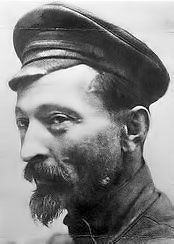

|
23A008 Russia in 1923 by Jim Davies, 2/21/2023
While America was thriving and Germany was in anguish 100 years ago, the people of Russia had been pummeled beyond endurance and had begun a seven-decade disaster under Marxism. Whereas twenty years earlier the country was racing to catch up with the far more prosperous West, two catastrophes set it back: the Czar needlessly entered WW1 and lost, and in the resulting shambles Lenin entered the scene as a "strong man" and ruined what little remained. Nicholas II had begun the War in August 1914 by attacking Austria and so triggering the MAD system of alliances that (by treaty) obliged Germany to come to its aid and France to join Russia. Britain joined the fray with much less obligation, and the rest is history: the US intervention broke the stalemate in 1918 but a year before that Germans routed the ill-equipped Russians and rounded off a victory at Brest-Litovsk after allowing Lenin and his pals to cross Germany to enter Petersburg and start his revolution. At once, Marx's odious principles were put into practice and all were ordered to work for the collective. 
That didn't sit well with Russian farmers, who held the old-fashioned idea that if they produced food they should be free to sell it for profit; so when Dzerzhinsky confiscated what they had grown they naturally stopped producing. He replied with some of the most vicious laws ever penned - follow that link to see some. The result even so was that the population was hungry, and that was unhealthy for the new régime so Lenin reversed course and in 1923 put in place his "New Economic Policy." This was quite significant; the key event in Russia one century ago was that its architect confirmed, by his action, that Communism cannot work. That confession was not advertised as such and while the "new" policy (which was close to the "old" one of letting farmers keep and sell their own produce) did stop the starving, Lenin died the following year and his doctrinaire colleagues pared it down by the decade's end so that the starvation and confiscation were repeated in the 1930s. Among other areas, peasants in Ukraine died by the million when the Communists raided and emptied their barns. The resentment there explains why German invaders were welcomed as liberators 20 years later and it remains today. Lenin probably didn't read it, but a year before 1923 in Vienna, Ludwig von Mises had written his masterpiece Socialism, proving what Lenin was discovering: that socialist central planning cannot take the place of the price signals which come only from a free market; and hence that it was doomed. Economies are dynamic and spontaneous; if they are planned instead, they are deeply sub-optimal. 1923 in Russia also saw the young Ayn Rand make preparations to escape the Workers' Paradise, so enabling her to reach America and turn political philosophy on its head, after her family too had been deprived of its living by the planners and grabbers. We've now taken a quick look at what was going on 100 years ago in America, Germany and here, Russia; and in each case 1923 was a kind of turning point in time. America was poised to prosper - after a short interrupt due to government manipulation of the money supply - and Germany, desperately looking for a way out of the vicious restrictions set by the WW1 victors, was poised to make a bad choice in the NSDAP. Russia, sadly, had already been pushed into another bad choice but in doing so had propelled one young lady to cross the world and pinpoint the false thinking underlying the faults of all three. Do her insights have as good a chance of realization in the country of her birth as they do here? It doesn't look too bright currently, with its government fighting for the country's right to exist, against the FedGov's proxy war to bring it under Uncle's umbrella; something a person would certainly have the right to do. But States are not individuals, so have no such rights. However Russia has a strong tradition of culture and thought, of which some is much closer to anarchism than anything found in US literature. Tolstoy came closest, with his solemn vow never to work for the State. It could be that as the society evolves, people will grasp that the evil is not just a autocracy like it had prior to 1917, nor a Marxist dictatorship, but government itself of any kind. Leave it alone, and it may yet set the world an example. |
|
||||||||||||||||||||||||||||||||||||||||||||||